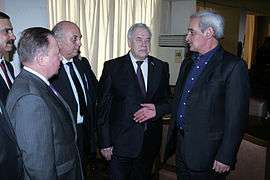Interparliamentary Assembly on Orthodoxy
|
Διακοινοβουλευτική Συνέλευση Ορθοδοξίας Межпарламентская Ассамблея Православия | |
 | |
| Abbreviation | I.A.O. |
|---|---|
| Formation | 5 November 1994 |
| Type | inter-parliamentary institution |
| Headquarters |
22-24 Vas. Amalias St. Athens, Greece |
Membership | parliamentary committees of 21 national parliaments |
Official language | Greek, Russian, English, French |
Secretary General | Anastasios Nerantzis |
President of the General Assembly | Sergei Popov |
| International Secretariat | |
Main organ | General Assembly |
| Website |
eiao |
The Interparliamentary Assembly on Orthodoxy (Greek: Διακοινοβουλευτική Συνέλευση Ορθοδοξίας, Russian: Межпарламентская Ассамблея Православия), or I.A.O., is a transnational, inter-parliamentary institution that in 1994 was established as European Interparliamentary Assembly on Orthodoxy (EIAO).
Based in Athens, Greece, the Interparliamentary Assembly on Orthodoxy constitutes a permanent communication structure between parliamentarians of the members' states aiming at unity in diversity of Orthodox Christians on the basis of the principles and values of Christianity and democracy.[1]
History

Inspired by a conference held from 30 June to 4 July 1993 in Chalkidiki on the topic of "Orthodoxy in the New European Reality", the European Interparliamentary Assembly on Orthodoxy was formed on initiative of the Hellenic Parliament.[2] Following the 1993 Manifesto of the Participants, the official Founding Act was passed by the participants of the Founding Synod held in November 1994 in Athens.[3] After in 2001, groups of MPs from Australia, Asia, Africa and the U.S.A. participated in the General Assembly, the organization was renamed Interparliamentary Assembly on Orthodoxy (I.A.O.).[2]
During the 2004 General Assembly in Kiev, Ukraine, in June 2004, it was decided to seek cooperation with the Parliamentary Union of the Organisation of Islamic Cooperation (P.U.I.C.). A co-operation agreement was drafted at an Athens meeting of the two organizations on March 22, 2005.[2] On 19 May 2010, a cooperation agreement with the Pan-African Parliament was signed by PUIC's President Idriss Ndele Moussa and I.A.O.'s Secretary-General Anastasios Nerantzis[4]
Institutional bodies
General Assembly
Supreme organ of the I.A.O. is the General Assembly consisting of the delegations of all member parliaments. It convenes annually in June. The President of the General Assembly is elected for a two-year tenure by the plenary session of the Assembly. The General Assembly convenes once annually during the month of June.[5]
- Presidents of the General Assembly
- since 2004: Sergei Popov (
 State Duma, United Russia)
State Duma, United Russia)
International Secretariat
The International Secretariat appoints eight standing committees. It is headed by the Secretary-General, the Alternate Secretary and the Treasurer, and consists of additional five members.[5]
- Secretary-General: Anastasios Nerantzis (
 Hellenic Parliament, Nea Demokratia)
Hellenic Parliament, Nea Demokratia) - Alternate Secretary: Ioannis Amanatidis (
 Hellenic Parliament, Syriza)
Hellenic Parliament, Syriza) - Treasurer: Maria Kollia-Tsaroucha (
 Deputy Minister for Macedonia and Thrace, ANEL)
Deputy Minister for Macedonia and Thrace, ANEL)
Member countries
The Assembly currently consists of parliamentary committees of 21 countries, namely:[5]
Additionally, delegations from Australia, Asia, Africa and the United States have been participating in the Assembly.
References
- ↑ "Declaration of the 20th anniversary annual General Assembly" (PDF). Interparliamentary Assembly on Orthodoxy. 29 June 2013. Retrieved 13 March 2015.
- 1 2 3 "History". Interparliamentary Assembly on Orthodoxy. Retrieved 13 March 2015.
- ↑ "Manifesto of the participants – Founding Act – Regulation of Functions" (PDF) (2nd ed.). Interparliamentary Assembly on Orthodoxy. 2013. Retrieved 13 March 2015.
- ↑ "Co-operation Agreement between the Pan-African Parliament and the Interparliamentary Assembly on Orthodoxy" (PDF). Interparliamentary Assembly on Orthodoxy. 2010. Retrieved 13 March 2015.
- 1 2 3 "About the I.A.O.". Interparliamentary Assembly on Orthodoxy. Retrieved 13 March 2015.
External links
- Official website (English) (Greek) (Russian)